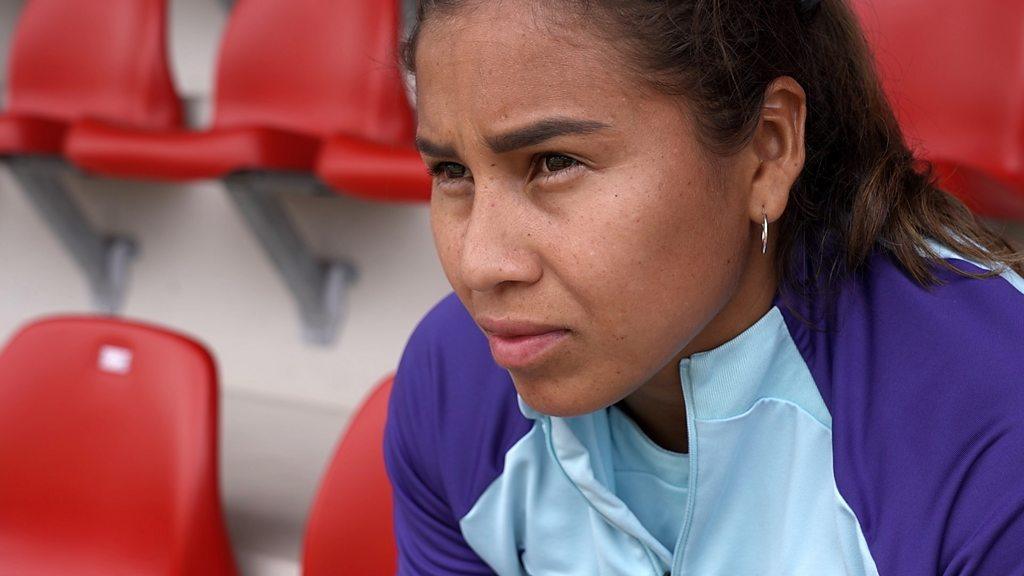Women's World Cup: Football's new idols in the fight for women's rights
- Published
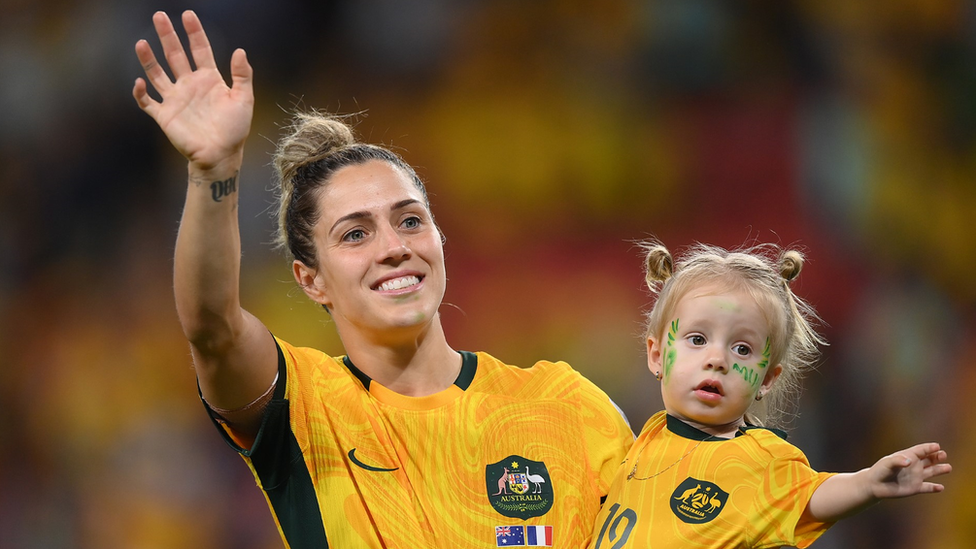
Katrina Gorry waves to the crowds with two-year-old daughter Harper after the Australia v France quarter-final
When Australia's Katrina Gorry swept the ball into the back of the net during a penalty shoot-out at this year's World Cup, she looked to the crowd and made a rocking motion with her arms - a tribute to her two-year-old daughter Harper.
Later, she carried Harper on to the pitch, the pair in matching kits waving proudly as the crowds roared for the victory against France.
Mums have taken to the playing field in numbers in this year's competition, giving visibility to their experiences of balancing parenting with playing football at the highest level.
This image of strong, successful women publicly embracing motherhood has sent a powerful message to the world.
Brazil's legendary footballer Marta also drew attention to these new role models, as she gave an emotional farewell message when her team left the tournament.
"When I started there were no idols in women's football," she said. "Twenty years later, we have become a reference for many women all over the world, not only in football."
With the World Cup attracting up to two billion viewers, players have used the spotlight to highlight issues that affect women fighting for their rights across the globe.
"Sport is a microcosm of society," says Ali Bowes, a lecturer in the sociology of women's sport at Nottingham Trent University in the UK. "If you can tackle gender inequality in sport, you're going to go some way to tackling gender inequality problems in the wider world."
She believes changes in women's football will "transfer over" to other parts of society.
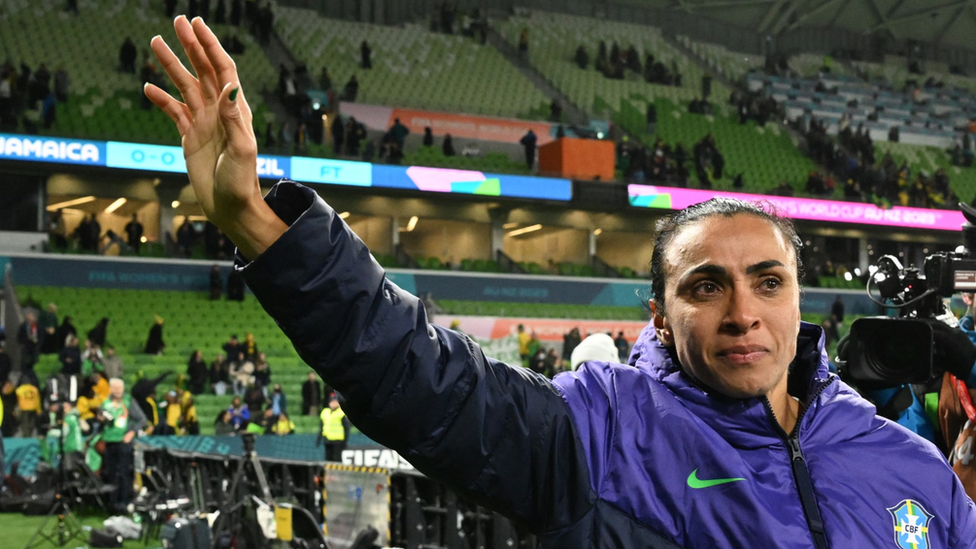
Marta bowed out of the World Cup as the greatest scorer in the tournament's history, with 17 goals
The two most obvious areas where women footballers have made advances are maternity rights and equal pay.
"Players have typically been expected to choose between motherhood and a professional sports career," says Stacey Pope, who researches gender, sport and inequality at the University of Durham in the UK.
"This is because sport as a career choice is based on a male model and gender roles still associate men with the role of breadwinner or provider, and women with nurturing and motherhood."
But today's elite players are rewriting the rules. In another memorable moment at this year's World Cup, US star Alex Morgan excused herself while speaking to reporters to take a video call from her three-year-old daughter.
Also, Spain's Irene Paredes brought her son to Australia with her explaining in a Fifa interview: "When your child is so young, you need him, but he needs you as well."
Along with big names such as Ireland's Áine O'Gorman, China's Zhang Xin and Jamaica's mother-of-three Cheyna Matthews, Paredes has talked openly about the challenges and choices the job brings.
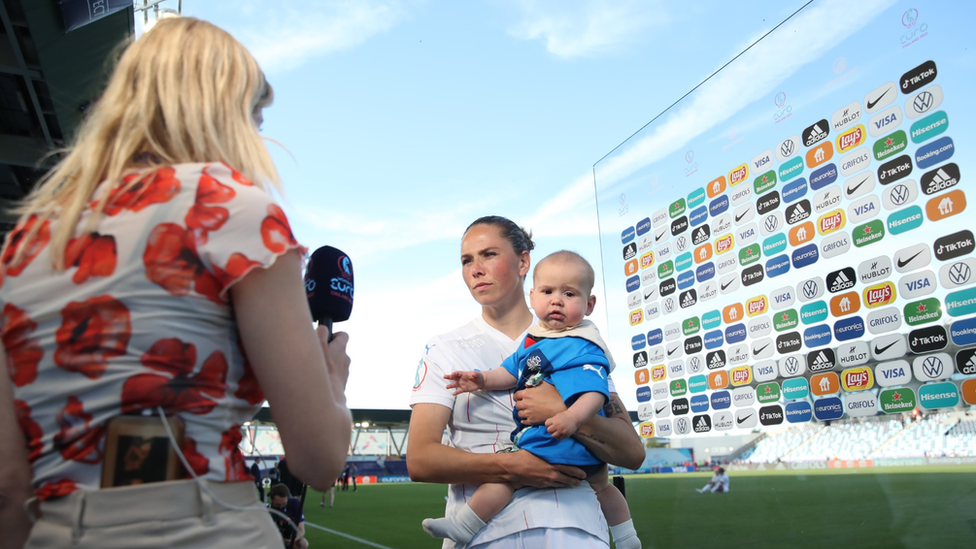
Iceland captain Sara Björk Gunnarsdóttir has been a pioneer in the fight for maternity rights
In the past women players didn't generally have maternity rights because football has historically been a male dominated institution, according to Bowes. "Why would men have thought that women, who are now contracted, need employment protection for being pregnant?"
It wasn't until January 2021, that international football's ruling body Fifa introduced mandatory maternity rules for federations, giving players full pay during pregnancy and at least 14 weeks' leave. During maternity leave they must be paid at least two-thirds of their salary.
Despite this move, some players have had to keep fighting to make sure clubs abide by the rules.
In a landmark case, Iceland's former captain Sara Björk Gunnarsdóttir became the first player to win a claim under the Fifa maternity regulations, after her former club Lyon failed to pay her full salary during pregnancy.
"This is about my rights as a worker, as a woman and as a human being," she said after the ruling in 2022.
"The victory felt bigger than me. It felt like a guarantee of financial security for all players who want to have a child during their career," she wrote in The Players' Tribune., external
Equal pay
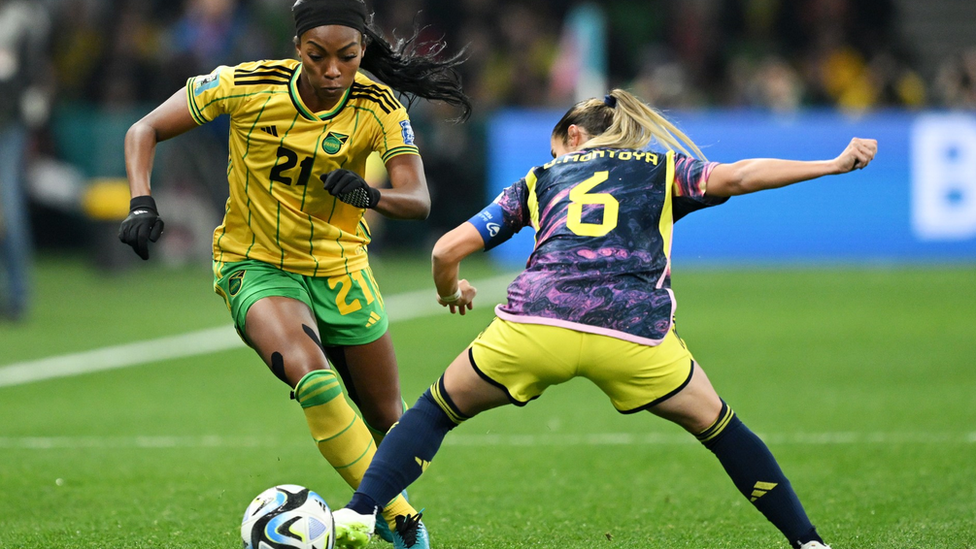
Cheyna Matthews says the Jamaican team had to find the money themselves to make it to the World Cup
Another area where progress has been made is pay - although equal remuneration is still a long way off.
This year, for the first time, women players were guaranteed a share of prize money based on their team's success. The amount ranges from $30,000 (£23,476) to $270,000 (£211,286) for each player depending on how far they progressed in the competition.
UN Women have called on Fifa to go further and equalise prize money by the next World Cup, closing the gap between the prize fund of $109m (£86m) for the women's teams and the $437m (£344m) given to the men in Qatar 2022.
Fifa's president Gianni Infantino, has said it is "our ambition" to guarantee pay parity by 2027.
The UN women's sports lead, Jennifer Cooper, says the responsibility for making this happen rests with a number of groups: "Sponsors and broadcasters will also need to step up, and national federations have a huge role to play in making equal pay a reality for women's football," she says.
In the meantime, a lack of pay, medical supervision and suitable training facilities is putting the world's top women footballers at risk, according to a recent report from the global professional footballers' union FifPro.
One Jamaican player, Cheyna Matthews revealed that the mother of one of her club teammates had started a crowd funding campaign to raise $100,000 so that the Reggae Girlz could compete in this year's tournament.
In an open letter, the players said they had received "subpar" support from the federation and expressed concerns about nutrition and accessibility to proper resources, calling for "immediate and systematic change".
In response the Jamaican federation said it acknowledged things had not been done perfectly, and it was "working assiduously to resolve them".
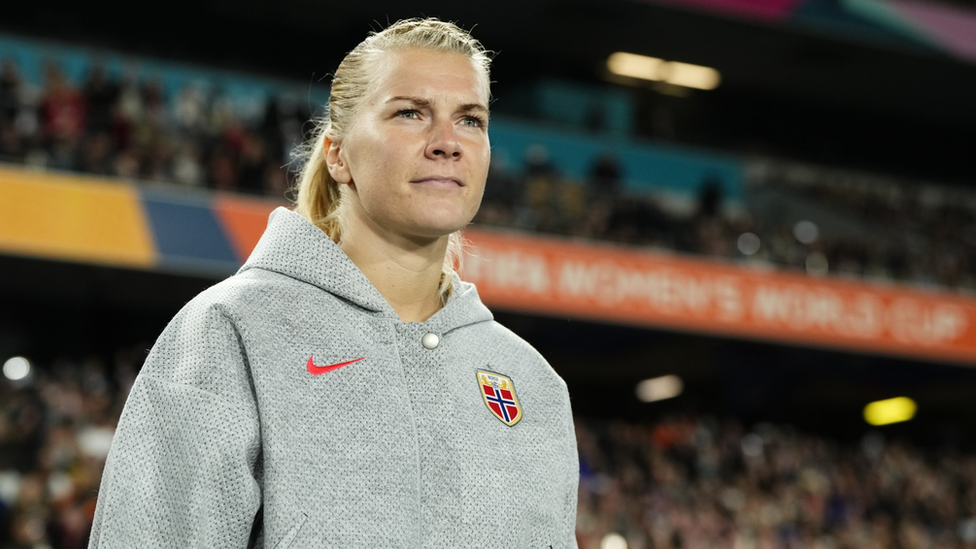
Norwegian player Ada Hegerberg decided to take action over what she believed were unfair working conditions
This is far from the first protest over women's treatment. Nigeria held a sit-in at their hotel over unpaid allowances and bonuses in 2016. Then in 2017 Norwegian player Ada Hegerberg boycotted a World Cup, over what she called a "lack of respect" for female players and criticised "the men in suits".
And American footballers took legal action against US Soccer in 2019, claiming the women's team were "consistently paid less money than their male counterparts" despite their "superior" performance. The US have won the Women's World Cup four times, while the men's best finish is a third place from 1930.
Eventually, the US national players were awarded a $24m pay-out in February last year, along with a pledge from US soccer to equalise pay between men and women.
But this is not just about equal pay, according to Alex Culvin, head of strategy and research at FifPro union. "Equal pay can often mask other inequalities," she says. "Women players face short contracts with remuneration that is not sufficient to ensure they can live."
The players' public fight for better conditions "enables other women to have a louder voice or perhaps feel braver about speaking out," says Bowes.
The experiences of footballers can also give women confidence to speak out against other issues, such as emotional and sexual abuse. An investigation into the US national league provided an example of women successfully standing up to a big institution and the abuse of power.
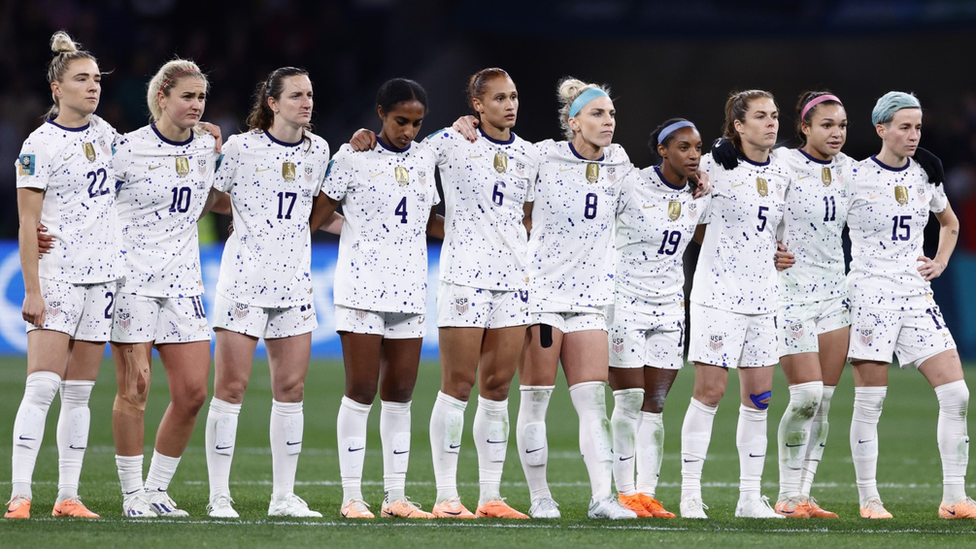
US player Megan Rapinoe (far right) has been one of the most vocal players in the fight for equal pay - and has faced abuse as a result
Research by the University of Durham shows that fans are behind the players in their battles off the pitch. In interviews with adults attending the 2019 World Cup, fans said they saw themselves as part of the fight for equality in society.
"Fans in our research argued that players speaking out about issues they faced meant that this would have an impact on gender equality and could break down barriers and help to reduce sexism more widely," Stacey Pope, co-author of the study, told BBC 100 Women.
But Bowes believes that when top players speak out, it can come at a personal cost. "They do open themselves up to being scapegoats or being ridiculed," she says.
In the latest twist in a long-running spat between American star player Megan Rapinoe and Donald Trump, the former president tweeted after the team's early exit from the World Cup: "WOKE EQUALS FAILURE. Nice shot Megan, the USA is going to Hell!!! MAGA."
"It's like a tightrope for the players," says Bowes and warns that being a role model can be a "heavy tag to wear".
"To expect these women to be everything all the time, and inspire the next generation and fight people's rights and play football and probably have another job because they don't get paid a lot… it's a big ask of these players. But no-one else is going to do it."
Additional research by Mai Kanaaneh

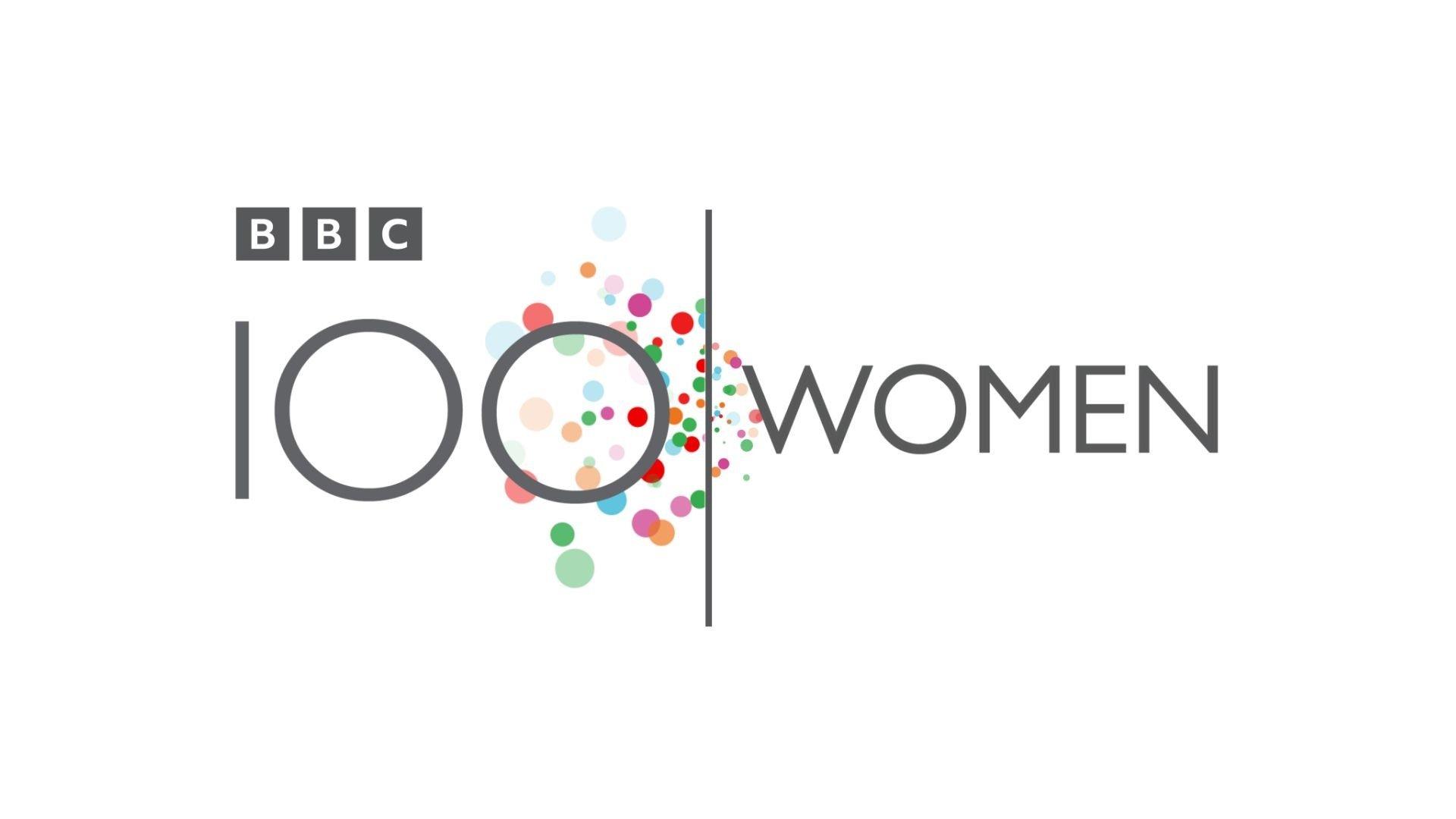
BBC 100 Women names 100 inspiring and influential women around the world every year. Follow BBC 100 Women on Instagram, external, Facebook, external, and Twitter., external Join the conversation using #BBC100Women.
- Attribution
- Published18 August 2023
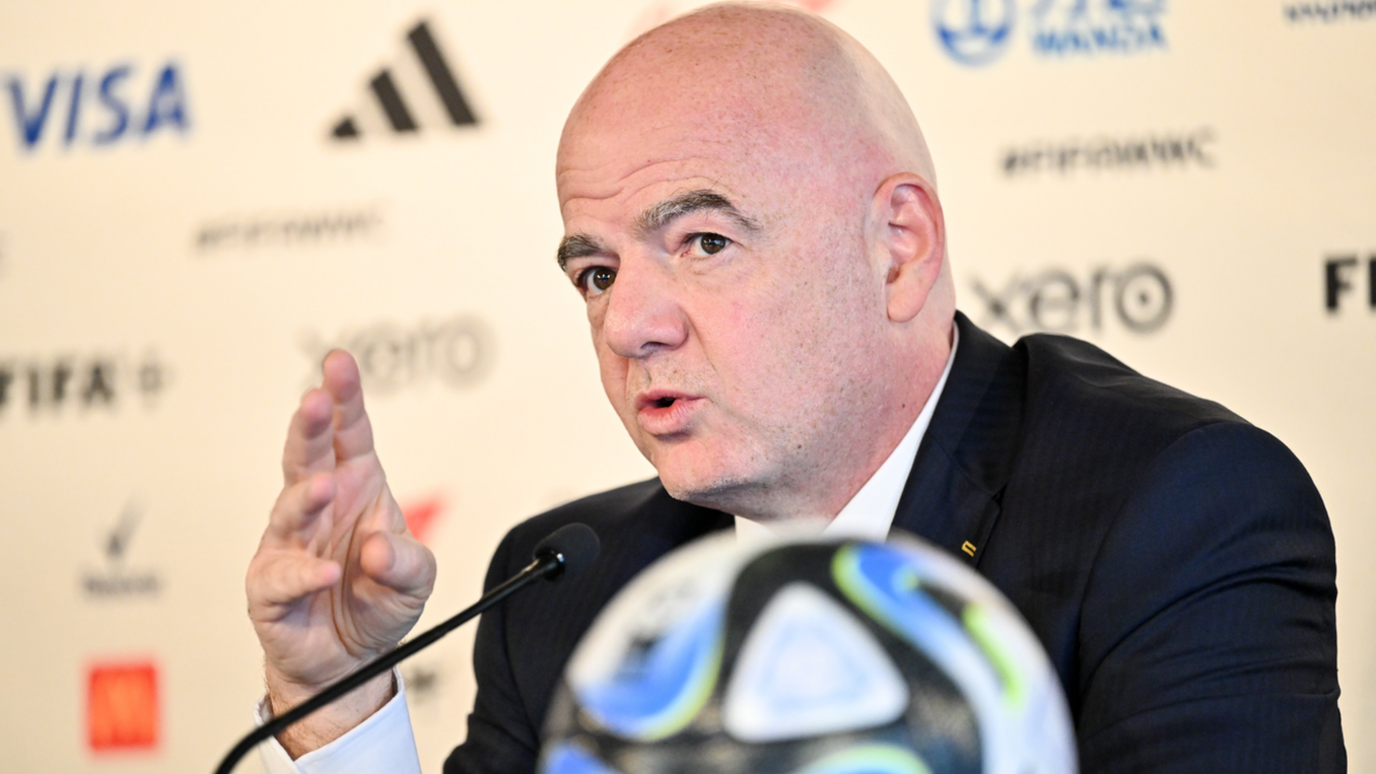
- Published20 June 2023
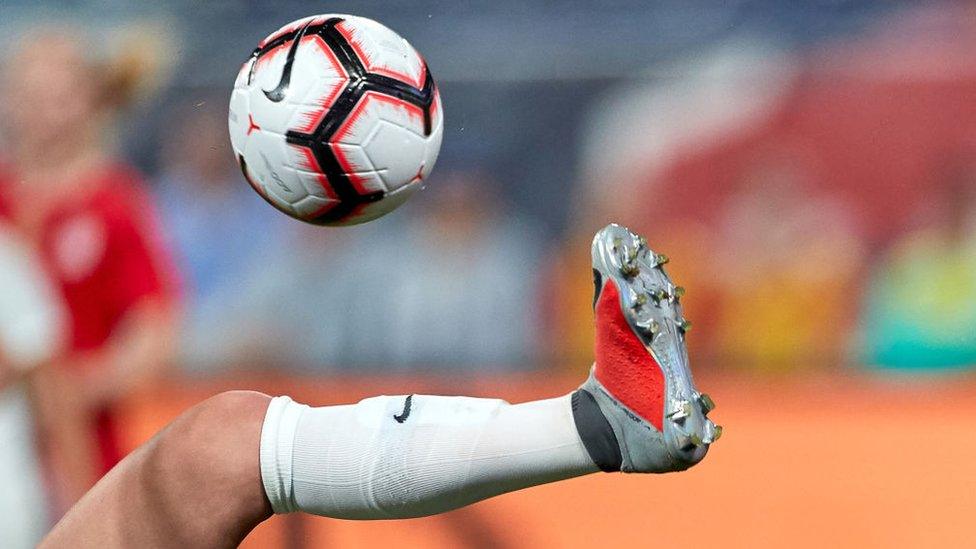
- Published24 July 2023
